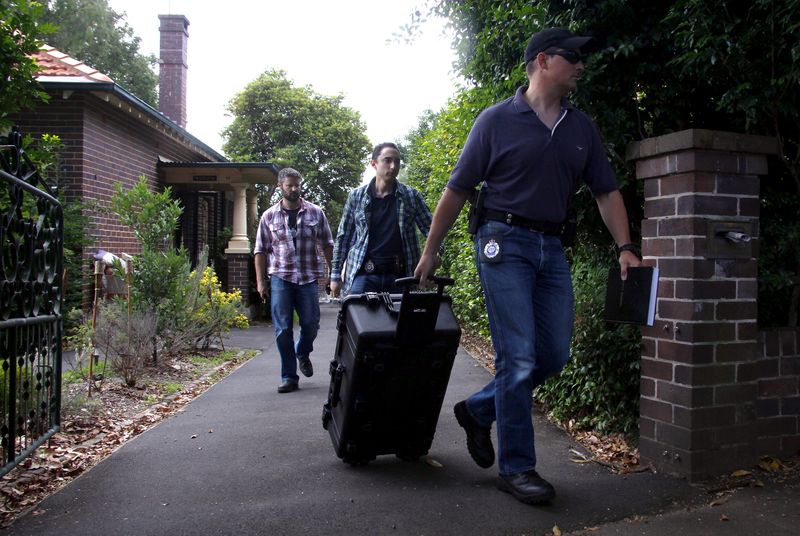By Jeremy Wagstaff
SINGAPORE (Reuters) - The stakes are high in the hunt for Satoshi Nakamoto, the person or people behind bitcoin, not just for the journalist who gets it right first, but also for the cryptocurrency itself.
An Australian entrepreneur and academic, Craig Steven Wright, is the latest candidate, outed in articles by Wired magazine and technology news website Gizmodo hours before his home and office in Sydney were searched by police.
Both articles said investigations based on leaked emails, documents and web archives pointed strongly to Wright being "Nakamoto". "Either Wright invented bitcoin, or he's a brilliant hoaxer who very badly wants us to believe he did," said Wired.
But the search has already tripped up several journalists, most famously Newsweek's Leah McGrath Goodman, who identified Japanese American Dorian Prentice Satoshi Nakamoto in March 2014 as bitcoin's creator.
Dorian Nakamoto denied it - as has nearly everyone else alleged to be the mastermind credited with writing the paper, protocol and software in 2008 that gave rise to bitcoin and its underlying blockchain technology.
Unmasking the "real" Nakamoto would be significant both for the future development of bitcoin and, potentially, the currency's market value.
While any changes to the bitcoin protocol can only be implemented by consensus, the proven founder of the cryptocurrency could hold considerable sway.
"Decision-making power doesn't rest with any individual, but Nakamoto is such a mythical figure, if he appears he could become a sort of messiah to the community," said Roberto Capodieci, a Singapore-based entrepreneur focussing on the blockchain.
ELECTRONIC MINERS
Persuading that community is not easy: while the system is decentralised by design, a cluster of so-called bitcoin miners based in China are key, Antony Lewis, a Singapore-based bitcoin consultant, said.
Unlike traditional currency, bitcoins are not distributed by a central bank or backed by physical assets such as gold, but are "mined" using computers to calculate increasingly complex algorithmic formulas.
Miners run pools of computers that process transactions and create new bitcoins, an energy intensive business that has frozen out all but a handful of players.
The group effectively scuttled a recent effort by one key bitcoin thinker to make processing simpler and cheaper, Lewis said.
David Moskowitz, Singapore-based founder of start-up bitcoin brokerage Coin Republic, said knowing who Nakamoto was would be significant "because people are looking for a core voice behind (bitcoin). It would help us understand what Satoshi thought".
Then there's the fact that bitcoin researchers believe he or she may be holding up to 1 million bitcoins, which if sold today would fetch $414 million (£273 million).
If Nakamoto chose to sell out, or even hinted that he might, that would push the price down, reducing the incentive to mine which might in turn provoke a steeper fall in the currency, Lewis said.
On the other hand, Nakamoto could help reduce uncertainty by reassuring bitcoin users he was not going to sell his holdings in one go or, more drastically, do something called "burning" — publicly deleting the coin by sending them to a bitcoin address to which he or she did not have the key.
"It would be like throwing the money into the bottom of the sea, and reduces the uncertainty of dumping onto the market," said Lewis.
"MR BITCOIN"
Wright has not commented publicly on the Wired and Gizmodo reports, and Reuters attempts to contact him using various listed email addresses were unsuccessful.
Fellow tenants at the north Sydney office building listed as the address of one of his companies described him as "an outgoing guy", who they nicknamed "Mr Bitcoin" because he had once offered to pay for some work in the currency.
And even if Wright did admit to being Nakamoto, he would still have to prove it.
That could be done by announcing he would move some of the bitcoin believed to belong to him, and then doing so, or signing a message with one of the encryption keys used in emails known to have been written by Nakamoto when bitcoin first appeared.
Wright has not been a prominent member of the bitcoin community, but he has appeared at several gatherings in the past year or two.
Moskowitz, who met him at a Singapore conference last year, said he was interesting and pleasant to talk to. "He's clearly very intelligent and fits the profile," he said. "But that doesn't necessarily mean he is Nakamoto."
Hints as to Wright's own feelings on unmasking Nakamoto can be found on Quora, a website where users answer questions posed by other users and vote for the best answer.
In September someone with his name, position and profile picture "upvoted" another Quora user's comment that "as a currency that is meant to be 'for the people, by the people', it is probably smart that no one knows who exactly started this coin. It is perfect that Satoshi Nakamoto founded it and vanished."

(The story was refiled to add the full name of the start-up in paragraph 13 and corrects date (to 'last' year from 'this' year) in paragraph 23)